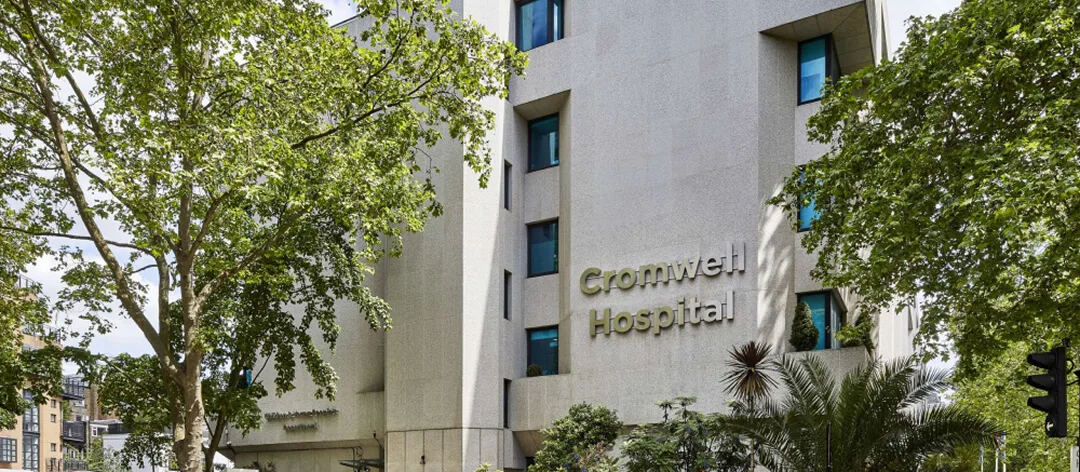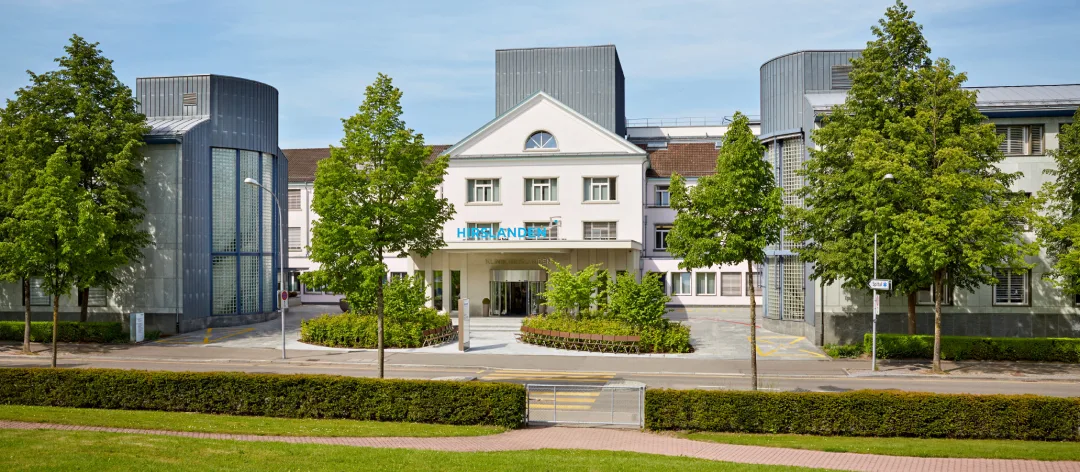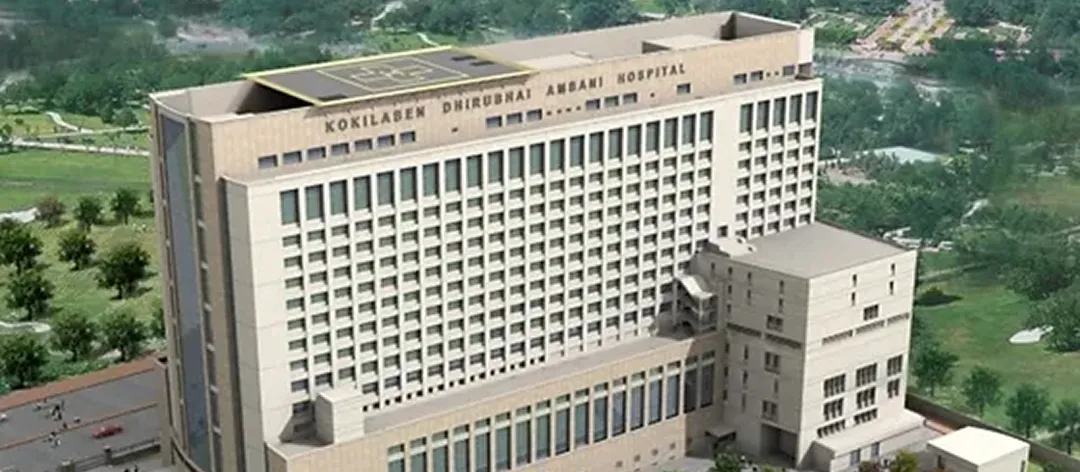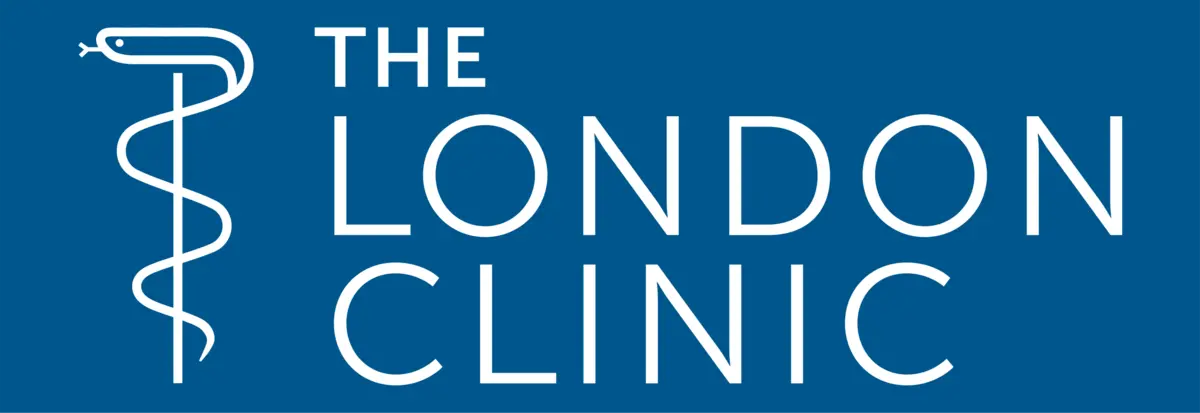Around the world, there are hospitals that specialise in prostate cancer care, combining advanced technology, experienced specialists, and holistic patient support to help you heal and recover with confidence.
This guide introduces you to some of the best prostate cancer hospitals across Europe, Asia, and beyond, and shows how My 1Health can help you access the one that’s right for you.
Whether you're seeking better outcomes, advanced robotic procedures, or simply want to explore options beyond your home country, you're not alone.
My 1Health guides you through every step of this journey from selecting a hospital and sending your medical records, to coordinating travel, treatment, and recovery.
We're here to make world-class prostate cancer care accessible, understandable, and fully personalised to your needs.
Prostate Cancer Treatment Hospitals in the United Kingdom
1. Cromwell Hospital, London
Cromwell Hospital is a JCI-accredited facility in Central London known for its advanced prostate cancer care and international patient services.
It was among the first in the UK to install the da Vinci Xi and SP robotic systems and has successfully performed 300+ robotic-assisted prostatectomies, offering faster recovery and lower complication rates.

The hospital features a comprehensive prostate diagnostic pathway with MRI-fusion biopsy and PSMA PET-CT imaging, ensuring accurate staging.
A multidisciplinary team including urologists, oncologists, radiologists, and nurse specialists collaborates on personalised treatment plans.
International patients benefit from visa assistance, multi-language coordination, and follow-up arrangements, making Cromwell a top choice for patients seeking advanced prostate cancer treatment in the UK.
2. Bishops Wood Hospital, Middlesex
Bishops Wood Hospital in Middlesex offers specialised prostate cancer care with a focus on personalised treatment and minimally invasive technology.
It features MRI guided biopsy, IMRT/IGRT radiation therapy, and skilled urologists collaborating with oncologists and radiologists in a multidisciplinary model.
The hospital’s compassionate nursing team operates day and night, delivering oncology care with high patient satisfaction and secure awards like the Macmillan Quality Environment Mark and staff accreditation from AfPP.
International patients benefit from interpreter services, and seamless coordination of appointments, travel, and aftercare all in a peaceful, healing environment.
Need prostate cancer treatment at Bishops Wood Hospital, Middlesex? Talk to a patient support specialist to get connected.
3. Blackheath Hospital, London
Blackheath Hospital, part of Circle Health Group, delivers expert prostate cancer care in a calm, patient focused environment.
It offers robot-assisted prostate surgery, MRI-fusion biopsy, and precision radiotherapy (IMRT/IGRT).
The urology team includes Mr Azhar Khan, a consultant who performs 100+ robotic cases annually, achieving a 98% patient recommendation rate.
The hospital maintains a 4.4 rating from 370+ patient reviews, praised for its cleanliness, comfort, and attentive staff.
International patients benefit from same-day consultation bookings, private rooms, concierge services, and translator support all designed to ease the stress of receiving treatment in a foreign country.
Prostate Cancer Treatment Hospitals in Germany
1. Academic Hospital Solingen
Academic Hospital Solingen offers advanced prostate cancer surgery including laparoscopic and robotic-assisted prostatectomy, backed by research-focused clinical practices.
Known for strong urology and oncology departments, Solingen provides personalized plans for each patient.
Academic Hospital Solingen is a modern, research-driven facility with a strong focus on prostate cancer treatment.
Serving over 27,000 inpatients and 30,000 outpatients each year across 716 beds, it’s equipped with robotic-assisted and laparoscopic prostate surgery supported by the newest minimally invasive technology.
Germany leads Europe in robotic surgeries with nearly 46% of prostatectomies using robotics so Solingen delivers care on par with international standards.
Under the leadership of Prof. Markus Heuser, whose 349 scientific publications testify to his expertise, patients benefit from tailored, evidence-based treatment plans.
Through My 1Health international patients receive full support, including visa assistance, interpreters, and care coordination.
Prostate Cancer Treatment Hospitals in Spain
1. Dexeus University Hospital, Barcelona
Dexeus University Hospital is a leading private university hospital with over 45,000 patients treated and 10,000+ surgeries performed annually.
Specialising in prostate cancer, it offers da Vinci robotic prostatectomy, 3D laparoscopic nerve-sparing surgery, and MRI-fusion biopsies.
A multidisciplinary team including urologists, oncologists, radiologists, pathologists, and psycho-oncology reviews every case in tumour boards, ensuring personalised treatment guided by cutting edge imaging and genetics.
The Oncology Patient Support Unit offers care coordination, nutrition counselling, physiotherapy, and emotional support to aid recovery.
Supported by international patient services, My 1Health can organise your consultation, travel logistics, and aftercare to make Barcelona care accessible and stress-free.
Prostate Cancer Treatment Hospitals in Switzerland
1. Hirslanden Klinik, Zurich
Hirslanden Klinik in Zurich is Switzerland’s largest private hospital and a certified European Cancer Centre.
Its Prostate Cancer Centre offers MRI-ultrasound fusion-guided biopsies with a 70 – 80% detection rate in suspicious lesions, and da Vinci robotic prostatectomies, preserving nerves with 3D precision.

Around 140 robotic prostate surgeries are performed annually by its experienced urology team. At weekly multidisciplinary tumour boards, specialists personalise treatment plans incorporating surgery, radiotherapy, HIFU, or active surveillance.
The hospital includes a Global Patient Office to assist international visitors with visa coordination, language interpretation, and follow-up care.
My 1Health can manage these arrangements, guiding you through every step before, during, and after your treatment.
Prostate Cancer Treatment Hospitals in South Korea
1. Samsung Medical Center, Seoul
Samsung Medical Center (SMC) is a leading cancer facility in Seoul, managing over 45,000 surgeries annually and regarded as one of Asia’s most advanced cancer centers.
Its Prostate Cancer Unit is equipped with da Vinci robotic surgery, MR-guided HIFU (High-Intensity Focused Ultrasound) for early-stage disease, and PSMA PET‑CT imaging for precise staging.
140+ international accreditations and consistent top rankings (Newsweek’s “World’s Best Hospitals” in urology) speak to its excellence.
Patients benefit from an English‑speaking Global Healthcare Center that handles consultations, visa assistance, accommodation, and concierge services. My 1Health can coordinate your access, ensuring a stress‑free medical journey tailored to your needs.
2. Severance Hospital, Seoul
Severance Hospital, is South Korea’s largest teaching hospital with 2,437 beds, treating approximately 840,000 inpatients and 2.5 million outpatients annually.
Since introducing the da Vinci robotic system in 2005, it has performed over 10,000 robotic prostate surgeries, making up nearly 26% of all robotic procedures at the hospital.
Impressively, 96% of those patients remain cancer free post-surgery. Its International Health Care Centre welcomes more than 50,000 foreign patients each year, offering visa assistance, multi-language interpreters, concierge services, and e-health follow-up systems.
My 1Health can coordinate every step of treatment at Severance Hospital from initial consultation and secure records transfer to travel arrangements and long-term recovery support ensuring your treatment is smooth and well planned.
Prostate Cancer Treatment Hospitals in India

1. HCG Cancer Centre, India
HCG Cancer Centre, India’s largest dedicated cancer network, operates across 20+ hospitals and manages over 10,000 new cancer cases annually.
Its prostate cancer services include laparoscopic and robotic prostatectomy, IGRT radiotherapy, hormone therapy, and follow-up care.
HCG also offers remote video consultations and digital second opinions, helping international patients begin their care from anywhere.
Teams cross-review cases during weekly tumour boards to ensure optimal, personalised care plans.
Patient reviews consistently highlight prompt treatment, clear communication, and supportive teams making it a trusted portal for prostate cancer treatment.
2. Medanta – The Medicity, Gurgaon
Medanta – The Medicity is home to one of India’s busiest oncology centres, offering da Vinci robotic prostate surgery, image-guided radiation therapy (IGRT), and PET-CT diagnostics.
Renowned urologists at Medanta perform 200+ prostate cancer surgeries per year, combining technical skill with a holistic approach to recovery covering pelvic rehabilitation, continence care, and psycho-oncology.
A dedicated International Patient Services desk supports patients with appointment booking, travel assistance, and language services.
Medanta’s Tumour Board meets weekly for collaborative decision-making, ensuring each patient receives a precision treatment plan tailored to their individual needs.
3. Kokilaben Dhirubhai Ambani Hospital, Mumbai
Kokilaben Hospital in Mumbai is a 750-bed tertiary centre offering cutting-edge prostate cancer care.
It provides MRI-fusion biopsies, 70+ robotic prostatectomies annually, and advanced radiation options such as IMRT and brachytherapy.

A strong multidisciplinary team a mix of urologists, radiation oncologists, radiologists, and supportive care experts delivers patient-centred treatment plans.
The hospital also features aftercare services including physiotherapy and rehabilitation.
International patients are well-supported with an International Desk offering help with visas, appointment scheduling, accommodation, and local guidance, creating a smoother pathway to care.
4. Fortis Healthcare, India
Fortis Healthcare’s urology teams have completed over 500 robotic urology procedures including prostate cancer surgeries since installing the da Vinci Xi system in 2017.
The hospital also launched BK Fusion MRI-ultrasound prostate biopsy for more accurate detection of clinically significant tumours.
Its multidisciplinary department includes urologists, oncologists, radiologists, and cancer nurses delivering tailored care.
Strong patient feedback highlights less bleeding, faster recovery, and high satisfaction with fewer complications.
Fortis is JCI-accredited, and international patients benefit from concierge services including visa assistance, interpreter access, and travel coordination.
5. Apollo Hospitals, India
Apollo Hospitals operates a network of 70+ hospitals across India, with over 3,200 doctors providing robotic prostate surgery options at select locations.
Its urology teams perform thousands of prostatectomies annually using the da Vinci system, with many patients reporting hospital stays of 3 nights and fast recovery.
Alongside surgery, Apollo offers advanced radiation therapies (such as IMRT and proton therapy where available), PSA monitoring, and MRI-fusion biopsy.
Multidisciplinary tumour boards meet regularly to ensure personalised care. The International Patient Division organises quick appointment scheduling, assistance with travel documentation, and language support, making treatment accessible for both domestic and overseas patients.
6. Artemis Hospital, Gurgaon
Artemis Hospital, a 600-bed multi-specialty centre, offers advanced prostate cancer treatments including robot-assisted prostatectomy, PET-CT diagnostics, and comprehensive radiation therapy.
Since launching robotic surgery in 2018, Artemis teams have performed over 150 such procedures with high patient satisfaction and low complication rates.
The centre emphasises early diagnosis, wellness counselling, and structured rehabilitation plans covering continence and pelvic muscle therapies.
An International Patient Service unit manages overseas consultations, hospitality services, language assistance, and follow-up care. Artemis combines affordable pricing with a focus on both clinical quality and patient comfort.
Prostate Cancer Treatment Hospitals in Thailand
1. Bumrungrad International Hospital, Bangkok
Bumrungrad International Hospital in Bangkok is Southeast Asia’s largest private hospital, treating over 1.1 million patients annually, including 520,000 international visitors.

The Robotic Surgery Center, established in 2016, performs da Vinci-assisted prostatectomies, enabling faster recovery and reduced risk of incontinence and erectile issues.
It also provides MRI-ultrasound fusion biopsies, PSMA PET-CT imaging, and hydrogel spacers to protect healthy tissue during radiation.
A multidisciplinary Horizon Cancer Center includes urologists, oncologists, genetic experts, and psycho-oncologists who meet weekly to plan tailored treatment.
Through a dedicated International Medical Coordination Office, My 1Health can streamline your consultation, visa, accommodation, and aftercare making your journey to Bangkok clear and supported.
Prostate Cancer Treatment Hospitals in Turkey
1. Acibadem Healthcare Group
Acibadem Hospitals, a JCI-accredited facility in Turkey, offers world-class prostate cancer care with advanced robotic-assisted surgery using the da Vinci Xi system.
The hospital also provides PSMA PET scanning, MRI-ultrasound fusion biopsies, and precision IMRT radiotherapy.
A dedicated International Patient Services Center supports over 50,000 foreign patients annually, handling appointments, visas, translation, lodging, billing, and follow-up.
Each prostate cancer case is reviewed by a multidisciplinary tumour board, ensuring treatment is carefully tailored.
My 1Health can coordinate your journey from securing expert consultations to managing travel and aftercare enabling a seamless and confident treatment experience in Turkey.
2. Memorial Healthcare Group
Memorial Hospital, a JCI-accredited facility in Şişli is a leading destination for prostate cancer care.
Equipped with da Vinci robotic systems, their centers perform 95% of prostatectomy patients discharged within 2 days, with 90–95% cancer-control success rates and consistently low complication rates (<5%).

Their services include PSMA PET scans, MRI-fusion biopsies, robotic prostate surgery, and therapies such as HIFU and CyberKnife.
A 252-bed flagship hospital supports patients from over 90 countries annually, aided by an International Patient Center offering visa assistance, interpreters, and full concierge coordination.
My 1Health ensures seamless access to Memorial handling consult requests, travel planning, and follow-up care so you feel supported from start to finish.
3. Liv Hospital
Liv Hospital in Istanbul is a JCI-accredited international hospital known for its advanced prostate cancer care.
It features a dedicated Robotic Surgery Centre one of the first outside the U.S. to be recognized with an SRC Center of Excellence award.
Here, experienced urologists perform da Vinci Xi robotic prostatectomies, delivering high precision with smaller incisions and faster recovery.
The hospital’s Cancer Centre offers comprehensive care including 4D HDR brachytherapy, HIFU, PSMA PET imaging, and multidisciplinary tumour boards for personalised planning.
Treating patients from over 180 countries, Liv provides visa assistance, multilingual coordination, and concierge services. My 1Health organises your consultation, travel, and aftercare to ensure a smooth treatment journey.
Prostate Cancer Treatment Hospitals in the UAE
1. American Hospital Dubai (AHD)
American Hospital Dubai, a JCI accredited Mayo Clinic Network member, leads prostate cancer care in the UAE.
It offers da Vinci Xi assisted robotic prostatectomy, PSMA PET-CT diagnostics, and was first in the region to introduce Focal One® Robotic HIFU a non-invasive ultrasound treatment that targets tumours precisely while preserving healthy tissue.
Led by Dr Muhammad Elmussareh, a UK-trained urologist with 20+ years of robotic surgery experience, the hospital achieves rapid recovery: most prostate surgery patients leave within two nights.
AHD’s Global Patient Office manages everything from same-day diagnostics to visa and accommodation services.
My 1Health coordinates your AHD pathway, from initial consultation and medical record transfer to travel arrangements and follow-up making world-class prostate care in Dubai accessible and stress-free.
2. King’s College Hospital Dubai (KCH)
King’s College Hospital Dubai brings over 175 years of UK medical excellence to the UAE and treats more than 1 million patients annually.

With 70% of clinicians trained in the UK, its Urology team provides advanced prostate cancer diagnostics such as PSA testing, multiparametric MRI, and MRI-fusion biopsyplus robot-assisted prostatectomy using the da Vinci system.
The hospital also offers comprehensive post-surgery support, including continence and erectile rehabilitation programs.
Through its International Patient Services team, KCH Dubai manages visa applications, interpreter support, appointment scheduling, and telehealth follow-up.
My 1Health can help organise your entire care from arranging your initial consultation to coordinating travel and recovery so you receive trusted, world-class treatment abroad.
3. Mediclinic City Hospital
Mediclinic City Hospital, located in Dubai Healthcare City, is a 280 bed specialist centre renowned for its advanced prostate cancer treatments.
Its Department of Urology uses the da Vinci Xi robotic system, and the hospital has performed over 1,500 robotic urological procedures since launching its programme in 2020.
Prostatectomy surgeries benefit from precise, minimally invasive techniques that reduce hospital stay to 1–2 nights and accelerate recovery.
The expert-led team partners with oncology, radiology, and rehabilitation specialists to create comprehensive treatment plans.
International patients receive full assistance from appointment scheduling and visa support to translator services and post-treatment coordination with My 1Health managing the journey for a seamless patient experience.
4. NMC Royal Hospital
NMC Royal Hospital in Dubai’s DIP is a JCI-accredited facility known for its compassionate, patient-centred cancer care.
The 92-bed hospital excels in modern prostate cancer treatment, including MRI-guided biopsy, robotic-assisted prostatectomy, and targeted radiotherapy.
With over 138 doctors across 37 specialties, its urology team includes specialists like Dr Alaa Naziha delivering expert, minimally invasive procedures.
The hospital is conveniently located near Dubai International Airport, making it easy for international patients.
My 1Health can manage your entire care journey here: from specialist consultation and records sharing to seamless travel plans and guided recovery.
Prostate Cancer Treatment Hospitals in Singapore
1. Raffles Hospital
Raffles Hospital is a top-tier private medical centre in Singapore, serving over one million patients annually, with 35% from abroad.
Among its specialty centres, the Cancer Centre offers robot-assisted prostatectomy, precise MRI-fusion biopsies, and advanced radiotherapy.
A multidisciplinary team of oncologists, urologists, radiologists, and psycho-oncology experts collaborates to create personalised treatment plans, reviewed at weekly tumour boards.
International patients are fully supported by the Raffles International Patients Centre, which assists with appointments, language translation (serving 100+ nationalities), visa coordination, and accommodation.
My 1Health can streamline your experience from specialist consultation and medical record transfer to travel planning and aftercare so you can focus entirely on recovery.
Prostate Cancer Treatment Hospitals in Malaysia
1. Subang Jaya Medical Centre (SJMC)
Subang Jaya Medical Centre is a 444-bed tertiary hospital recognised for its excellence in prostate cancer treatment.
It features the da Vinci Xi robotic surgery system, which enables surgeons to perform precise, minimally invasive prostatectomies that reduce blood loss and speed recovery.
SJMC also provides multiparametric MRI-fusion biopsies and cutting-edge radiotherapy techniques. Its oncology department has won multiple regional awards for comprehensive cancer care.
A dedicated International Patient Centre offers round-the-clock support including appointment coordination, visa assistance, interpreters, and aftercare planning ensuring overseas patients feel at ease throughout their treatment journey.
2. Prince Court Medical Centre
Prince Court Medical Centre is a 270-bed, JCI-accredited hospital in Kuala Lumpur, renowned for its luxurious setting and advanced urology services.
It offers robot-assisted prostatectomy using the da Vinci system alongside 68Ga PSMA PET/CT scans for superior cancer detection and staging.
Its Cancer Centre combines high-tech equipment, compassionate care, and a comfortable environment resembling a high-end hotel.
With 24/7 eHealth services, international patients receive teleconsultations, translator support, and assistance with travel logistics.
Known for exceptional patient experience and award winning medical excellence, Prince Court ensures both comfort and quality for prostate cancer care seekers.

3. KPJ Healthcare
KPJ Healthcare is Malaysia’s largest private hospital network, with 29 specialist hospitals offering comprehensive prostate cancer care.
Many locations are equipped with da Vinci robotic systems, enabling minimally invasive surgery, and support diagnostics like MRI-fusion biopsy and PET imaging.
Its multidisciplinary teams include uro-oncologists, radiation oncologists, and supportive care specialists.
KPJ is praised for its cost-effective treatment packages and flexible payment schemes.
International patients benefit from dedicated support teams that manage everything from scheduling and visa applications to interpreter services and discharge planning.
KPJ’s extensive reach makes it a convenient choice for patients across the region seeking accessible, quality care.
4. Sunway Medical Centre
Sunway Medical Centre is a 724-bed private hospital and regional cancer care hub in Malaysia.
Its urology department offers robot-assisted prostatectomy, image-guided biopsies, and state-of-the-art radiotherapy, including VMAT and IGRT.
The hospital provides full-spectrum care from diagnosis through treatment to rehabilitation with access to psycho-oncology and physical therapy.
Sunway has received multiple international awards for its oncology programs and patient safety.
Its International Patient Services team arranges consultations, visa processing, airport transfers, interpreters, and post-treatment follow-up, ensuring a seamless and supportive experience for patients travelling for prostate cancer care.
Prostate Cancer Treatment Hospitals in Vietnam
1. Vinmec International Hospital
Vinmec International Hospital delivers high-level prostate cancer care using modern diagnostics and surgical techniques.
Its Da Vinci robotic programme has successfully treated early urologic cases, with average stays of just 3–4 nights and minimal complications.
The Oncology Centre provides 4D-VMAT radiotherapy, PET/CT imaging, and access to clinical trials in partnership with global centres like Cleveland Clinic.
Multidisciplinary tumour boards ensure personalised treatment plans, while a dedicated international patient team handles visas, accommodations, and interpreter services.
My 1Health can streamline your care journey from consultations to travel and follow-up for patients from different countries like Australia, South Korea, the U.S., UK, Laos, and Cambodia who would like to go to Vietnam for prostate cancer treatment.
How My 1Health Helps You Access the Right Prostate Cancer Treatment Hospital
My 1Health is here to make going for treatment abroad easier, safer, and tailored to your needs.
Our mission is to help you find the right specialist, understand the treatment costs, and handle your travel & accommodation logistics so you can focus on your health.

Here’s how we support you:
- Booking Appointments with Top Specialists: My 1Health will identify the best prostate cancer experts at your chosen hospital and secure timely appointments for consultations or second opinions.
- Secure Medical Records Transfer: We assist you in compiling your medical records (scans, biopsy results, medical history) and send them securely to the hospital ahead of your visit.
- Comparing Treatment Plans: My 1Health can help you obtain and compare treatment plans from multiple top hospitals. You’ll be able to see proposed treatments, costs, and timelines side by side, to make an informed decision.
- Visa, Travel, and Logistics Support: Our patient support specialists guides through getting a medical visa, books flights and arranges airport pickup and accommodation near the hospital.
If you have special needs (like wheelchair assistance or dietary requirements), we communicate those to the hospital and your hotel in advance. - Dedicated Support and Follow-Up: We provide you with a dedicated care coordinator who is available to you 24/7 during your treatment trip.
After your treatment, we also help coordinate follow up – whether it’s telemedicine check-ups with your foreign doctor or transferring care back to a local specialist.









